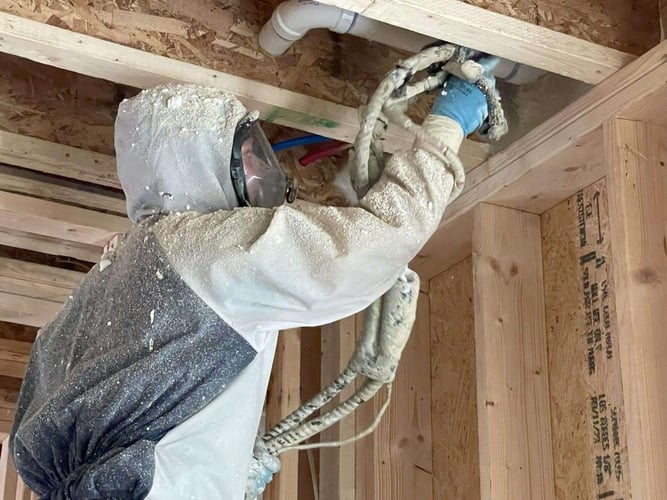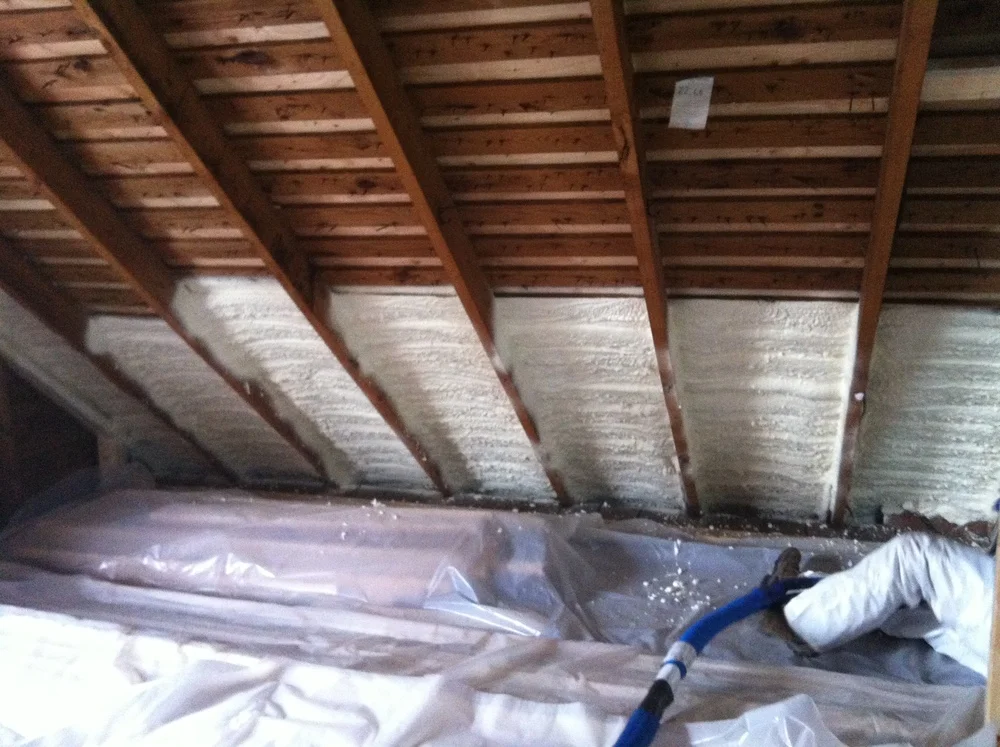Picking the Right Kind Of Spray Foam for Your Insulation Requirements
Picking the Right Kind Of Spray Foam for Your Insulation Requirements
Blog Article
Spray Foam: The Ultimate Option for Air Sealing and Insulation
Spray foam insulation has arised as a leading option for effective air sealing and thermal insulation, offering a distinct combination of properties that establish it apart from traditional approaches. Recognizing the complete range of its benefits, setup processes, and contrasts with other insulation types is crucial for making informed choices.
What Is Spray Foam?
Spray foam is a versatile insulation product that integrates the concepts of air sealing and thermal resistance to enhance power effectiveness in buildings. Composed largely of polyurethane or various other similar compounds, spray foam is used as a fluid that expands upon call with surfaces, creating a strong, constant layer of insulation. This distinct home enables it to fill voids, cracks, and voids that traditional insulation materials might forget, supplying a remarkable air seal.
There are two primary types of spray foam: open-cell and closed-cell. Open-cell spray foam is lighter and much more adaptable, using outstanding sound absorption and a reduced R-value per inch - Spray Foam. In contrast, closed-cell spray foam is denser, supplying a higher R-value, moisture resistance, and included structural honesty to building parts
The application process typically includes specialized devices, ensuring a seamless application that abides by numerous substrates, consisting of steel, concrete, and wood. This flexibility makes spray foam suitable for both brand-new constructions and retrofitting existing frameworks. Its capability to create an impermeable barrier dramatically adds to reducing energy consumption and boosting indoor air quality, consequently making it a recommended choice among home owners and building contractors alike.
Benefits of Spray Foam Insulation
One of one of the most substantial advantages of spray foam insulation is its phenomenal ability to produce a constant air obstacle, which properly decreases energy loss. Unlike conventional insulation materials, spray foam broadens to load cracks and spaces, ensuring that air leak is significantly lowered. This characteristic not only improves power performance yet additionally brings about reduce utility costs with time.
In addition, spray foam insulation gives premium thermal resistance, adding to an extra secure interior environment. Its high R-value per inch enables reliable insulation in restricted areas, making it optimal for attics, wall surfaces, and crawl areas. The moisture-resistant properties of spray foam aid protect against mold and mold growth, advertising much healthier living conditions.
Another critical advantage of spray foam insulation is its sound-dampening high qualities (Spray Foam). It effectively lowers sound transmission in between spaces, producing a quieter and a lot more comfy home setting. The longevity of spray foam additionally stands out, as it does not sag or work out with time, preserving its performance throughout its lifespan
Just How Spray Foam Functions
Comprehending exactly how spray foam insulation functions is necessary for valuing its effectiveness in air sealing and thermal resistance. Spray foam insulation contains two key elements: isocyanate and polyol material. When these components are combined, they undergo a chemical response that causes the material to increase rapidly, producing a thick foam that fills dental caries, fractures, and voids.
As the foam broadens, it follows surfaces, creating a closed seal that significantly minimizes air infiltration. This characteristic makes spray foam insulation extremely effective at preventing drafts and wetness infiltration, which can lead to energy loss and damage gradually. In addition, the closed-cell variant of spray foam provides superior thermal resistance because of its rigid structure, properly reducing warmth transfer.
The distinct residential or commercial properties of spray foam permit it to adapt irregular surface areas, guaranteeing comprehensive insurance coverage and a smooth obstacle. Because of this, spray foam insulation not just improves energy efficiency yet additionally adds to boosted interior air quality by minimizing the buildup of irritants and toxins. Inevitably, recognizing the mechanics behind spray foam emphasizes its duty as a remarkable choice for insulation and air securing in both property and industrial applications.
Installation Refine Summary

Before installation, the space must be sufficiently cleaned and prepped, ensuring that surfaces are devoid of dust, particles, and dampness. This reference step is vital due to the fact that contaminants can jeopardize adhesion and general efficiency. As soon as the area is prepared, the application involves blending the 2 components of the spray foam, which expands upon contact and loads gaps effectively.
Educated professionals ought to carry out the installation, using specialized equipment to guarantee consistent protection and ideal density. Security precautions, consisting of using protective gear and making certain correct ventilation, are imperative throughout this procedure. After application, the foam generally remedies swiftly, forming a solid obstacle that boosts power effectiveness.
Contrasting Spray Foam to Traditional Insulation
When evaluating insulation alternatives, spray foam insulation stands out in contrast to typical materials such as fiberglass and cellulose. Unlike fiberglass and cellulose, which can permit air infiltration, spray foam broadens upon application, filling up gaps and voids to produce a closed seal.
Additionally, spray foam offers a greater R-value per inch than conventional insulation kinds, providing even more reliable thermal resistance in a thinner profile. This characteristic is especially helpful in spaces with minimal tooth cavity deepness. Spray foam is resistant to moisture and mold development, which can be a considerable problem with cellulose and fiberglass, specifically in humid settings.
Nonetheless, spray foam insulation normally carries a higher in advance price than its typical counterparts. Homeowners need to evaluate this initial financial investment against long-lasting power cost savings and efficiency advantages. Inevitably, while both insulation kinds offer their i loved this purpose, spray foam arises as an extra innovative option for contemporary insulation needs, especially in regards to air sealing and thermal performance.

Conclusion
In summary, spray foam insulation stands for a very reliable service for achieving optimal air sealing and thermal resistance. Its one-of-a-kind residential properties, consisting of dampness resistance and audio dampening, make it suitable for various applications in both new buildings and retrofitting jobs (Spray Foam). The preliminary costs anchor might be higher contrasted to standard insulation materials, the lasting advantages, such as considerable energy savings and boosted interior air high quality, validate the investment and emphasize its worth in modern building methods.
Spray foam insulation has emerged as a leading remedy for effective air sealing and thermal insulation, providing a distinct combination of residential properties that establish it apart from typical methods.Spray foam is a functional insulation product that integrates the principles of air securing and thermal resistance to boost energy efficiency in buildings.When evaluating insulation choices, spray foam insulation stands out in comparison to conventional products such as fiberglass and cellulose. Inevitably, while both insulation types serve their purpose, spray foam arises as a much more advanced solution for modern-day insulation needs, specifically in terms of air securing and thermal efficiency.
In recap, spray foam insulation stands for an extremely reliable option for accomplishing ideal air sealing and thermal resistance.
Report this page